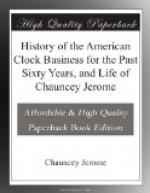CHAPTER X.
BARNUM’S CONNECTION WITH THE JEROME CLOCK CO.—CAUSES AND RESULTS OF ITS FAILURE.
The connection of Barnum with the Jerome Manufacturing Company of New Haven, and the failure of the Company have been the subject of much speculation to the whole world, and has never been clearly understood. Barnum claimed that he was cheated and swindled by this company, robbed of his property and name, and reduced to poverty. But before giving any statements, I call attention to the following article taken from the New York Daily Tribune, of March 24th, 1860:
The great showman.—P.T. Barnum, “the great American showman,” as he loves to hear himself called, who furnishes more amusement for a quarter of a dollar than any other man in America, is, we are happy to announce, himself again. He has disposed of the last of those villainous clock notes, re-established his credit up on a cash basis, and once more comes forward to cater for the public amusement at the American museum. To day, between the acts of the play, Mr. Barnum will appear upon his own stage, in his own costly character of the Yankee Clockmaker, for which he qualified himself, with the most reckless disregard of expense, and will “give a brief history of his adventures as a clockmaker, showing how the clock ran down, and how it was wound up; shadowing forth in the same the future of the museum.” Of course, Barnum’s benefit will be a bumper. Next week the Museum will be closed for renovation and repairs, and the week after it will reopen under the popular P.T.B., once more.
I will now give the true statement of facts and particulars of his connection with the Jerome Manufacturing Company—which, however, was not his first experience in clock-making. Some time before this, he was interested in a Company located in the town of Litchfield, Connecticut, and, I believe, owned about ten thousand dollars worth of stock. They made a very poor article which was called a marine clock, if I am rightly informed. That Company failed, and Barnum took the stock as security for endorsing and furnishing them with cash. I do not suppose the whole of the effects were worth transporting to Bridgeport, although estimated by him at a large amount. About this time Theodore Terry’s clock factory, at Ansonia, was destroyed by fire. A large portion of the stock was saved, though in a damaged condition, much of which was worth nothing—the tools and machinery being but




